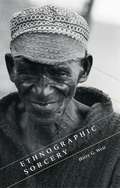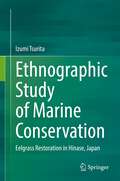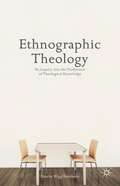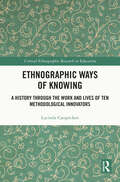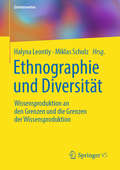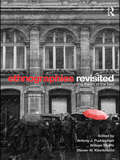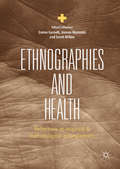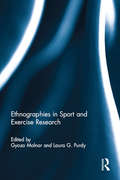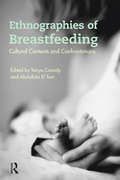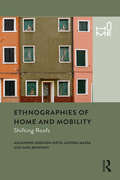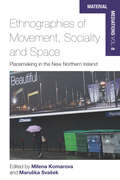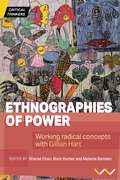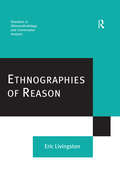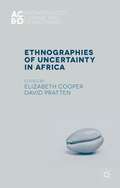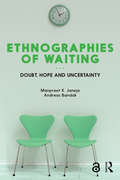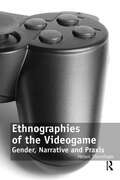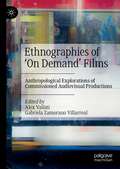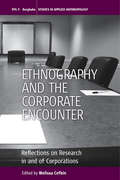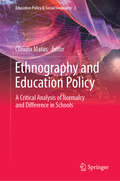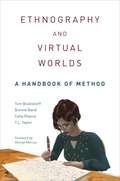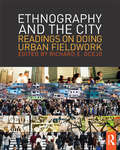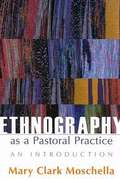- Table View
- List View
Ethnographic Sorcery
by Harry G. WestAccording to the people of the Mueda plateau in northern Mozambique, sorcerers remake the world by asserting the authority of their own imaginative visions of it. While conducting research among these Muedans, anthropologist Harry G. West made a revealing discovery---for many of them, West's efforts to elaborate an ethnographic vision of their world was itself a form of sorcery. In Ethnographic Sorcery, West explores the fascinating issues provoked by this equation. A key theme of West's research into sorcery is that one sorcerer's claims can be challenged or reversed by other sorcerers. After West's attempt to construct a metaphorical interpretation of Muedan assertions that the lions prowling their villages are fabricated by sorcerers is disputed by his Muedan research collaborators, West realized that ethnography and sorcery indeed have much in common. Rather than abandoning ethnography, West draws inspiration from this connection, arguing that anthropologists, along with the people they study, can scarcely avoid interpreting the world they inhabit, and that we are all, inescapably, ethnographic sorcerers.
Ethnographic Study of Marine Conservation: Eelgrass Restoration in Hinase, Japan
by Izumi TsuritaThis book explores the nature of marine conservation based on the case study of Hinase, a fishing village in Okayama, Japan. It focuses on the fishers’ self-motivated eelgrass restoration activity which has been continued for more than 30 years. This activity in Hinase recently attracted international attention as a case under the name “Satoumi” and “Marine Protected Areas” in several governmental reports, but detailed information, such as the historical background and social structure of Hinase, has not yet been analyzed. This book, therefore, fulfills this gap by providing its ethnographic information. In addition, this book offers some points for critical thinking by concluding that marine conservation activities cannot always be evaluated or arranged under the standardized approach with limited time and space. This viewpoint reaffirms the importance of local initiative and highlights the value of qualitative research to seek the way forward for promising marine conservation. This book is suitable for an academic audience in the field of social sciences, such as applied anthropology, as well as ecologists, government officials, environmentalists, and citizens who are interested or engaged in environmental issues or natural resource management.
Ethnographic Theology: An Inquiry into the Production of Theological Knowledge
by Natalie Wigg-StevensonThis book uses ethnography as theological practice, yielding a theology constructed at the intersection of church, academy and everyday life. Drawing on the author's research in her Baptist church, the resulting 'ethnographic theology' produces creative theological insights, while also proposing fresh alternatives for Christian thought and action.
Ethnographic Ways of Knowing: A History Through the Work and Lives of Ten Methodological Innovators (Critical Ethnographic Research in Education)
by Lucinda CarspeckenDrawing on the works of ten scholars and public intellectuals ranging over 200 years, this book foregrounds ways of knowing that include but go beyond the cognitive.The book explores the work of Harriet Martineau, Jane Addams, W. E. B. Du Bois, Zora Neale Hurston, Ella Deloria, M. N. Srinivas, Barbara Myerhoff, Orlando Fals Borda, Ronald Takaki and Nawal El Saadawi. The author discusses their multifaceted ethnographic practices and argues that such practices are still under-acknowledged in contemporary research in comparison to cognition and categorization. These scholars were outsiders to their societies in a variety of ways. They highlighted power imbalances in the perception and representation of one group by another and brought direct experience, emotion, narrative, imagination, recognition, self-reflection, activism and cultural humility into their writing, in addition to rationality. The book engages with the authors and their ideas in the context of their times and places. It also reclaims them as methodological predecessors, noting their contributions to what educational ethnography has been and what it could be in the future.Expanding the canon of social research history and providing insight into unique methodological forms, this text will be valuable for scholars and postgraduate students with interests in ethnography, as well as the history of research, anthropology and qualitative methods more broadly.
Ethnographie und Diversität: Wissensproduktion an den Grenzen und die Grenzen der Wissensproduktion (Erlebniswelten)
by Halyna Leontiy Miklas SchulzIm Mittelpunkt des Bandes steht die ethnografisch orientierte Forschungspraxis. Sie wird im Spiegel der in den Kultur- und Sozialwissenschaften aktuell kontrovers verhandelten Konzepte Diversität und Intersektionalität reflektiert. Besondere Aufmerksamkeit wird der Frage gewidmet, wie Forschende mit dem methodischen Problem der Produktion, Reproduktion und Reflexion von Kategorien umgehen. Welche Kategorien werden schon an das ‚Feld‘ herangetragen, später revidiert oder verfestigt und welche Kategorien begleiten schließlich den Interpretationsprozess und welche konstituieren die Ergebnisdarstellung? Wie und warum entstehen sie? Und nicht zuletzt: Wie werden durch (Forschungs-)Kategorien spezifische Erlebniswelten menschlicher Vielfalt mit hervorgebracht oder transformiert?Der InhaltKonzeptionelle Grundlagen • Diversität und Inklusion in Bildungskontexten • Interkultur in der Diversität • Diversität im Spannungsfeld von Körper, Geschlecht und BehinderungDie HerausgebendenDr. Halyna Leontiy ist Wissenschaftliche Mitarbeiterin am Zentrum für Gender- und Diversitätsforschung (ZGD) an der Universität Tübingen und seit November 2019 Gastwissenschaftlerin am Interdisziplinären Zentrum für Integrations- und Migrationsforschung (InZentIM) der Universität Duisburg-Essen.Dr. phil. Miklas Schulz vertritt seit dem Sommersemester 2019 die Professur Inklusive Pädagogik und Diversität am Institut für Erziehungswissenschaft der Universität Duisburg-Essen und ist Wissenschaftlicher Mitarbeiter (beurlaubt) am Institut für Sonderpädagogik an der Leibniz Universität Hannover.
Ethnographies Revisited: Constructing Theory in the Field
by William Shaffir Antony J. Puddephatt Steven W. KleinknechtEthnographies Revisited provides first-hand accounts of how leading qualitative researchers crafted key theoretical concepts found in their major book-length ethnographies. Great ethnographic research lies not in the rigid execution of prescribed methodological procedures, but on the unrelenting cultivation of theoretical ideas. These contributors focus squarely on this neglected topic, providing reflexive accounts of how research decisions were made in light of emerging theoretical questions. The continuous generation of creative concepts is arguably the most important skill in developing powerful results in field research, since the originality of the ideas produced is how the study is ultimately judged. Yet, this topic is often taken for granted, treated rigidly and artificially, or is entirely absent from existing qualitative research manuals. In contrast, this volume offers candid insights of how leading ethnographers generated their initial questions, chose their research sites, made theoretical and methodological adjustments, and oriented their research to maximize the conceptual payoff, leading to such successful research contributions. This provides a fresh approach to the topic of qualitative research, by linking practical decisions in the field to the dynamic features of theory in the making, told through the first-hand experiences of some of the best ethnographers in our field.
Ethnographies and Health: Reflections on Empirical and Methodological Entanglements
by Emma Garnett Joanna Reynolds Sarah MiltonThis edited collection explores the multiple ways in which ethnography and health emerge and take form through the research process. There is now a plethora of disciplinary engagements with ethnography around the topic of health, including anthropology, sociology, geography, science and technology studies, and in health care professions such as nursing and occupational therapy. This dynamic and evolving landscape means ethnography and health are entangled in new and different ways, providing a timely opportunity to explore what these entanglements do and affect in the social production of knowledge. Rather than discussing the strengths (and limitations) of ethnography for engaging with health, the book asks: what does ethnography enable, make visible and possible for knowing and doing health in contemporary research settings and beyond?
Ethnographies in Sport and Exercise Research
by Gyozo Molnar Laura PurdyEthnography has become an important method for researching and interpreting the social world, not least in the field of sport and exercise studies. Ethnographies in Sport and Exercise Research is the first book to provide a contemporary overview of the current state of ethnographic research and its application within sport and exercise, introducing and explaining a range of well-established and emerging ethnographic approaches. Featuring a heavyweight line-up of sport and exercise researchers, the book is divided into three parts. The first considers the methodological and theoretical aspects of ethnographic research, including: a history of ethnography in sport and exercise research the definition of the ethnographic field methods of gathering ethnographic data methods of representing ethnographic research. In the second part of the book, a series of chapter-length case studies, spanning sports from boxing to fell running and themes from gender to fandom, demonstrate the challenges and rewards of ethnographic research in the context of sport and exercise, helping students and researchers to develop a solid understanding of qualitative research at both a theoretical and a practical level. The final part of the book considers future directions for ethnographic research, including an evaluation of its place in the expanding field of study in sport management. A comprehensive assessment of the statement of ethnographic research in sport, Ethnographies in Sport and Exercise Research is invaluable reading for any research methods course taken as part of a degree programme in sport and exercise, and a useful reference for all active researchers.
Ethnographies of Breastfeeding: Cultural Contexts and Confrontations (Criminal Practice Ser.)
by Tanya Cassidy Abdullahi El TomBreastfeeding is an intimate and deeply rooted bodily practice, as well as a highly controversial sociocultural process which invokes strong reactions from advocates and opponents. Touching on a wide range of issues such as reproduction, sexuality, power and resources, and maternal and infant health, the controversies and cultural complexities underlying breastfeeding are immense.Ethnographies of Breastfeeding features the latest research on the topic. Some of the leading scholars in the field explore variations in breastfeeding practices from around the world. Based on empirical work in areas such as Brazil, West Africa, Darfur, Ireland, Italy, France, the UK and the US, they examine the cross-cultural challenges facing mothers feeding their infants.Reframing the traditional nature/culture debate, the book moves beyond existing approaches to consider themes such as surrogacy, the risk of milk banks, mother-to-mother sharing networks facilitated by social media, and the increasing bio-medicalization of breast milk, which is leading its transformation from process to product. A highly important contribution to global debates on breast milk and breastfeeding.
Ethnographies of Home and Mobility: Shifting Roofs (Home Ser.)
by Alejandro Miranda Nieto Aurora Massa Sara BonfantiThis book lays out a framework for understanding connections between home and mobility, and situates this within a multidisciplinary field of social research. The authors show how the idea of home offers a privileged entry point into forced migration, diversity and inequality. Using original fieldwork, they adopt an encompassing lens on labour, family and refugee flows, with cases of migrants from Latin America, Africa and the Indian subcontinent. With the book structured around these key topics, the authors look at how practices of home and mobility emerge along with emotions and manifold social processes. In doing so, their scope shifts from the household to streets, neighbourhoods, cities and even nations. Yet, the meaning of 'home' as a lived experience goes beyond place; the authors analyse literature on migration and mobility to reveal how the past and future are equally projected into imaginings of home.
Ethnographies of Movement, Sociality and Space: Place-Making in the New Northern Ireland (Material Mediations: People and Things in a World of Movement #8)
by Maruška Svašek Milena KomarovaExploring the complex dynamics of twenty-first century spatial sociality, this volume provides a much-needed multi-dimensional perspective that undermines the dominant image of Northern Ireland as a conflict-ridden place. Despite touching on memories of “the Troubles” and continuing unionist-nationalist tensions, the volume refuses to consider people in the region as purely political beings, or to understand processes of placemaking solely through ethnic or national contestations and territoriality. Topics such as the significance of friendship, gender, and popular culture in spatial practices are considered, against the backdrop of the growing presence of migrants, refugees and diasporic groups.
Ethnographies of Power: Working Radical Concepts with Gillian Hart
by Mark Hunter Michael Ekers Alex Loftus Stefan Kipfer Bridget Kenny Sharad Chari Zachary Levenson Jennifer Greenburg Melanie Samson Jennifer A Devine Ahmed VeriavaWorking with key concepts from theorist and human geographer Gillian Hart, this book argues for an ethnographic and geographic approach to critically engage contemporary political-economic processes in the context of real world struggles.
Ethnographies of Reason (Directions in Ethnomethodology and Conversation Analysis)
by Eric LivingstonWritten by one of the most eminent scholars in the field, Ethnographies of Reason is a unique book in terms of the studies it presents, the perspective it develops and the research techniques it illustrates. Using concrete case study materials throughout, Eric Livingston offers a fundamentally different, ethnographic approach to the study of skill and reasoning. At the same time, he addresses a much neglected topic in the literature, illustrating practical techniques of ethnomethodological research and showing how such studies are actually conducted. The book is a major contribution to ethnomethodology, to social science methodology and to the study of skill and reasoning more generally.
Ethnographies of Social Support
by Markus Schlecker Friederike FleischerWhy do elderly choose to move away from their children so as to not receive their support? Using a number of case studies, contributors explore social support as a tool of mutuality, or maintaining relatedness and sharing feelings, rather than preventing or patching up problems. This book helps correct the dominant framework of deliberate action.
Ethnographies of Uncertainty in Africa
by Elizabeth Cooper David PrattenThis collection explores the productive potential of uncertainty for people living in Africa as well as for scholars of Africa. Eight ethnographic case studies from across the continent examine how uncertainty is used to negotiate insecurity, create and conduct relationships, and act as a source for imagining the future.
Ethnographies of Waiting: Doubt, Hope and Uncertainty (Criminal Practice Ser.)
by Manpreet K. Janeja Andreas BandakWe all wait – in traffic jams, passport offices, school meal queues, for better weather, an end to fighting, peace. Time spent waiting produces hope, boredom, anxiety, doubt, or uncertainty. Ethnographies of Waiting explores the social phenomenon of waiting and its centrality in human society. Using waiting as a central analytical category, the book investigates how waiting is negotiated in myriad ways. Examining the politics and poetics of waiting, Ethnographies of Waiting offers fresh perspectives on waiting as the uncertain interplay between doubting and hoping, and asks "When is time worth the wait?" Waiting thus conceived is intrinsic to the ethnographic method at the heart of the anthropological enterprise. Featuring detailed ethnographies from Japan, Georgia, England, Ghana, Norway, Russia and the United States, a Foreword by Craig Jeffrey and an Afterword by Ghassan Hage, this is a vital contribution to the field of anthropology of time and essential reading for students and scholars in anthropology, sociology and philosophy.
Ethnographies of the Videogame: Gender, Narrative and Praxis
by Helen ThornhamEthnographies of the Videogame uses the medium of the videogame to explore wider significant sociological issues around new media, interaction, identity, performance, memory and mediation. Addressing questions of how we interpret, mediate and use media texts, particularly in the face of claims about the power of new media to continuously shift the parameters of lived experience, gaming is employed as a 'tool' through which we can understand the gendered and socio-culturally constructed phenomenon of our everyday engagement with media. The book is particularly concerned with issues of agency and power, identifying strong correlations between perceptions of gaming and actual gaming practices, as well as the reinforcement, through gaming, of established (gendered, sexed, and classed) power relationships within households. As such, it reveals the manner in which existing relations re-emerge through engagement with new technology. Offering an empirically grounded understanding of what goes on when we mediate technology and media in our everyday lives Ethnographies of the Videogame is more than a timely intervention into game studies. It provides pertinent and reflexive commentary on the relationship between text and audience, highlighting the relationships of gender and power in gaming practice. As such, it will appeal to scholars interested in media and new media, gender and class, and the sociology of leisure.
Ethnographies of ‘On Demand’ Films: Anthropological Explorations of Commissioned Audiovisual Productions
by Gabriela Zamorano Villarreal Alex VailatiOver the last two decades, the advent of cheap, user-friendly video technologies has contributed to a revolution in representational agency. Videos are now made by production units that are at times composed of families, churches, musical groups, community associations or other institutions. Thus, on-demand videos produced and distributed within local and atypical networks profoundly shape contemporary urban imaginaries. This book explores the intertwined relations among infrastructure, technology, and modernity through an ordinary, yet little studied field of "on-demand" audiovisual production, which involves processes of negotiation and interaction between clients and commissioned video makers. On-demand films are considered as a space of collaboration and self-representation, that allows to reflect on the potential of fiction, artifice, and montage to render material desires, aspirations, and ideas of the future.
Ethnography And The Corporate Encounter
by Melissa CefkinBusinesses and other organizations are increasingly hiring anthropologists and other ethnographically-oriented social scientists as employees, consultants, and advisors. The nature of such work, as described in this volume, raises crucial questions about potential implications to disciplines of critical inquiry such as anthropology. In addressing these issues, the contributors explore how researchers encounter and engage sites of organizational practice in such roles as suppliers of consumer-insight for product design or marketing, or as advisors on work design or business and organizational strategies. The volume contributes to the emerging canon of corporate ethnography, appealing to practitioners who wish to advance their understanding of the practice of corporate ethnography and providing rich material to those interested in new applications of ethnographic work and the ongoing rethinking of the nature of ethnographic praxis.
Ethnography and Education Policy: A Critical Analysis of Normalcy and Difference in Schools (Education Policy & Social Inequality #3)
by Claudia MatusThis book addresses the relationship between the production of social problems in educational policy, the research practices required to inform policy, and the daily production of normalcies and differences in school contexts. It reports on the opportunities and consequences for policy, research, and practice when normalcy is stigmatized at the same level as difference. The book employs a critical analysis combining queer, feminist, and post-representational theories to understand the implications of dominant ways of understanding the division between normal and different subjectivities and how they reiterate structures of inequality in schools.
Ethnography and Virtual Worlds: A Handbook of Method
by Tom Boellstorff Celia Pearce Bonnie Nardi T. L. TaylorA practical guide to the ethnographic study of online virtual worldsEthnography and Virtual Worlds is the only book of its kind—a concise, comprehensive, and practical guide for students, teachers, designers, and scholars interested in using ethnographic methods to study online virtual worlds, including both game and nongame environments. Written by leading ethnographers of virtual worlds, and focusing on the key method of participant observation, the book provides invaluable advice, tips, guidelines, and principles to aid researchers through every stage of a project, from choosing an online fieldsite to writing and publishing the results.Provides practical and detailed techniques for ethnographic research customized to reflect the specific issues of online virtual worlds, both game and nongameDraws on research in a range of virtual worlds, including Everquest, Second Life, There.com, and World of WarcraftProvides suggestions for dealing with institutional review boards, human subjects protocols, and ethical issuesGuides the reader through the full trajectory of ethnographic research, from research design to data collection, data analysis, and writing up and publishing research resultsAddresses myths and misunderstandings about ethnographic research, and argues for the scientific value of ethnography
Ethnography and Virtual Worlds: A Handbook of Method, Updated Edition
by Tom Boellstorff Celia Pearce Bonnie Nardi T. L. TaylorA practical guide to the ethnographic study of online cultures, and beyondEthnography and Virtual Worlds is the only book of its kind—a concise, comprehensive, and practical guide for students, teachers, designers, and scholars interested in using ethnographic methods to study online virtual worlds, including both game and nongame environments. Written by leading ethnographers of virtual worlds, and focusing on the key method of participant observation, the book provides invaluable advice, tips, guidelines, and principles to aid researchers through every stage of a project, from choosing an online fieldsite to writing and publishing the results.Provides practical and detailed techniques for ethnographic research customized to reflect the specific issues of online virtual worlds, both game and nongameDraws on research in a range of virtual worlds, including Everquest, Second Life, There.com, and World of WarcraftProvides suggestions for dealing with institutional review boards, human subjects protocols, and ethical issuesGuides the reader through the full trajectory of ethnographic research, from research design to data collection, data analysis, and writing up and publishing research resultsAddresses myths and misunderstandings about ethnographic research, and argues for the scientific value of ethnography
Ethnography and the City: Readings on Doing Urban Fieldwork (The Metropolis and Modern Life)
by Richard E. OcejoThe only collection of its kind on the market, this reader gathers the work of some of the most esteemed urban ethnographers in sociology and anthropology. Broken down into sections that cover key aspects of ethnographic research, Ethnography and the City will expose readers to important works in the field, while also guiding students to the study of method as they embark on their own work.
Ethnography as a Pastoral Practice: An Introduction
by Mary Clark MoschellaEthnography is a way to tap the deep undercurrents in a community through a process of gathering, analyzing, and sharing data. The author informs clergy on how they can use it to give themselves ears to hear their members' own stories, deep wisdom, and longing for God. The uniqueness of her work lies in its ability to galvanize aspirations and heal communal hurt. She lays out the helpful pastoral practice of ethnography in a clear, step-by-step manner and includes many compelling case studies of transformational leadership.
Ethnography in Organizations (Qualitative Research Methods, Volume #27)
by Helen B. SchwartzmanWritten in a clear, easy-to-follow style, Ethnography in Organizations evaluates the wide range of ethnographic research that has been-- and continues to be-- conducted in organizations. Beginning with the classic definition of bureaucracy and rational organization presented by Max Weber, author Helen B. Schwartzman analyzes three main paradigms-- functional studies, structural analyses, and interpretive research. Using the Hawthorne Study as a starting point, this useful volume explores such topics as the roles and methods used by organizational ethnographers, the problems and prospects for conducting fieldwork in organizations, the "incorporation" of American life, and the role that everyday, but often overlooked, routines play in the production and reproduction of organizations, institutions, and society. Replete with vivid examples taken from both public and private sector settings, Ethnography in Organizations is a must for anyone conducting research in an organizational setting.
